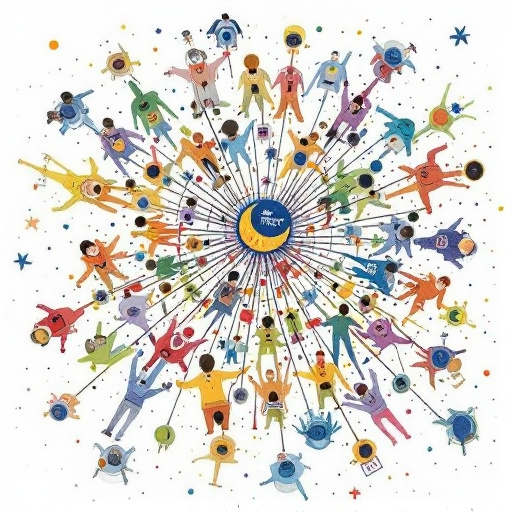Featured Articles
- Alumni as Unseen Influencers: How Grad Networks Shape Social Movements and Cultural Trends Today
- "Behind the Curtain: How College Alumni Networks are Fueling the Rise of Gig Economy Side Hustles"
- "From Campus to Cosmos: How College Alumni are Shaping Space Exploration and Tech Innovation"
- From Cap and Gown to Crypto: How College Alumni Are Shaping the Future of Digital Currency
- "From Classmates to Competitors: The Surprising Rivalries Among College Alumni and Their Impact on Careers"
Alumni as Unseen Influencers: How Grad Networks Shape Social Movements and Cultural Trends Today
Alumni as Unseen Influencers: How Grad Networks Shape Social Movements and Cultural Trends Today
Alumni networks often act as hidden powerhouses, wielding significant influence in shaping cultural trends and social movements. This article delves into the myriad ways these grad networks operate, showcasing their impact through various examples, statistics, and stories, revealing the powerful connections that often go unnoticed.
The Power of Alumni Networks
Alumni networks, often seen as formal entities focused on fundraising, have evolved into dynamic platforms that feed into broader social movements and cultural narratives. They are treasuries of talent, connections, and experiences, echoing the adage that it’s not just what you know, but who you know.
Understanding the Context
The concept of a collective alumni identity dates back to as early as the 17th century. Fast-forward to today, and we can see how alumni from universities like Harvard, Stanford, and even smaller liberal arts colleges are forging connections that extend far beyond academic settings. Today, over 90% of university graduates in the United States maintain contact with their alma maters, providing fertile ground for collective action (National Alumni Association, 2022).
Case Study: The Harvard Connection
Take the Harvard alumni network, for instance. Graduates have formed pivotal roles in various movements since the 1960s. Figures such as Elizabeth Warren and Al Gore have used their platform not just to ascend political ladders but to galvanize activism and social change from environmental policies to economic reform.
Interestingly, alumni influence can be found in smaller, seemingly unassuming organizations. For example, the alumni of a little-known rural community college have rallied together to promote local business and environmental awareness, highlighting the ripple effect of networking can propagate even from less elite institutions.
The Statistics Behind the Networks
Numerous studies underline the sheer power of alumni networks. A report from LinkedIn indicates that individuals with expansive alumni connections are 65% more likely to be successful in landing jobs post-graduation. This statistic isn’t just about employment; it shows how those connections cultivate a sense of shared purpose and collective identity that can pivot into addressing social issues.
Furthermore, according to a Pew Research study in 2020, nearly 72% of Americans ages 18-29 believe that social media plays a significant role in social movements and culture change. Many of those movements find their roots in university education and alumni networks which, when combined, wield the potential to create substantial, grassroots impact.
How Alumni Shape Trends Today
Beneath the surface, alumni connections shape cultural trends in innovative ways. Many of today’s workplace ethics are influenced by movements started by college graduates who advocate for change, like the push for a four-day workweek or sustainable business practices.
A humorous example is the “broke millennial” trend stemming from many graduates finding themselves in substantial debt. Alumni have come together through platforms like Facebook and Instagram to share experiences and strategies, offering everything from budgeting tips to support groups. The “Broke Millennial” blog, for instance, was started by a millennial alumna who shared her experiences and inadvertently spurred a movement around financial literacy.
The Role of Digital Connections
In the digital age, the power of alumni networks has burgeoned into social media realms. Platforms like LinkedIn and Facebook have allowed thousands to connect, regardless of geographical boundaries. Therefore, the cultural influence of alumni today transcends the traditional networking model, morphing into a potent force for social change.
The Women’s Movement: An Alumni Example
The Women’s March in 2017 serves as an illustrative case. Organized largely through social media platforms by various alumni from institutions across the nation, it gathered millions to advocate for women’s rights. Many of the march leaders proudly identified as alumni from both major and minor educational backgrounds, showcasing a unified stance that transcended institutional barriers.
Building a Legacy of Change
When alumni unite around common goals—be it environmental activism, social justice, or economic equity—they collectively create a robust legacy that ripples through generations. Take the example of the University of California system: their alumni have spearheaded initiatives for climate action, ensuring that current students inherit a culture of activism and responsibility.
Moreover, universities are increasingly aware of their potential. Many are establishing specialized alumni relations departments focused on engagement in social causes and cultural trends, creating an environment that fosters commitment to change. As seen with the “Call to Action” initiative from Stanford, alumni are not just participants but leaders in modern dialogues addressing complex social issues.
The Ripple Effect
Picture a pebble thrown into a still pond. Alumni can often catalyze change in concentric circles, impacting their immediate community, workplaces, and ultimately the global stage. A noteworthy instance of this can be drawn from the success of the Ice Bucket Challenge, which was largely mobilized through the network of ALS patients and survivors, many of whom were graduates from diverse universities.
From Ideation to Realignment
Alumni networks have shown a unique ability to pivot. Consider the 2020 uprising that demanded racial equality. Graduates of various institutions—from diverse backgrounds—quickly mobilized to advocate for change in innovative ways, forming organizations like Black Alumni Network and others that immediately have tangible impacts in local communities. As a collective force, they initiated fundraisers, workshops, and direct action campaigns that resonate deeply within society.
Influencing the Next Generation
Let's not forget how these networks influence the younger generation! Alumni often become mentors, educators, and advocates. They bridge the gap from academic life into the real world, demonstrating to current students the importance of civic engagement and activism. A simple “Hey, I did this, and so can you” can spark a fire of ambition in a young grad student, propelling them toward significant contributions to society.
A case in point is the numerous university-led diversity and inclusion initiatives that stem from alumni lobbying for change. Participating in group mentorship programs or hosting panels, alumni ensure their successors understand the significance of advocacy and collective action.
Humor Meets Activism
Amidst all seriousness, the blend of humor and activism in alumni networks cannot be understated. Memes, witty social media posts, and online challenges often make serious issues more palatable, allowing broader audiences to engage. It’s been scientifically proven that humor serves as a highly effective tool in activism, fostering connections and garnering attention. Who would have thought that college alumni engaged in discussions about climate change through funny TikTok challenges would resonate with Gen Z? Well, it’s happening!
Conclusion: The Unseen Influence
In many ways, alumni networks function as the unseen influencers that keep societal wheels turning. They are the catalysts for movements, the bearers of change, and the champions of cultural shifts, often working quietly in the background yet making impactful strides that resonate across communities and generations. As we move forward in an increasingly interconnected world, understanding and harnessing the unseen influence of alumni can be key to building a brighter, more equitable future.
So, next time you see that old classmate post something on social media, remember: they might just be sparking the next big change!




